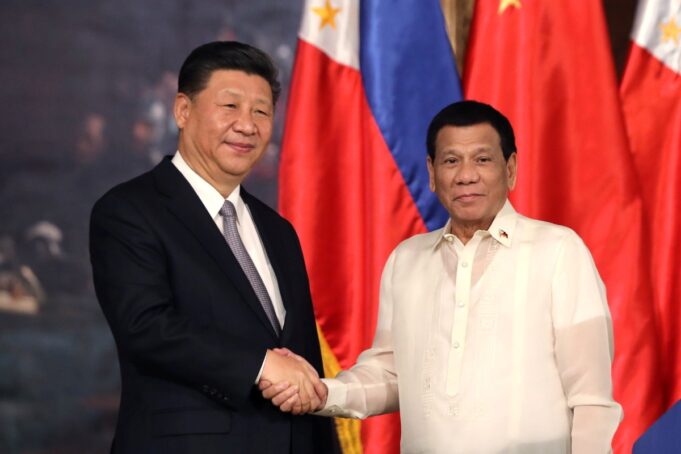The Philippines will not be cowed by a U.S. blacklist on Chinese companies and will continue doing business with the sanctioned firms, a spokesman for President Rodrigo Duterte said, insisting Manila will not bow to a foreign power.
Duterte won’t halt ongoing projects with Chinese businesses despite the American blacklist, spokesman Harry Roque told reporters Sept. 1, arguing infrastructure is a national priority and that the Philippines won’t subordinate its own interests to those of Washington.
“The president declared last night that the Americans can blacklist Chinese companies in their territories in America and maybe in their military bases under their jurisdiction,” Roque said. “But what the president said was clear: He will not follow the directives of Americans because we are a free and independent nation and we need those investments from China.”
The Donald Trump administration recently penalized 24 Chinese state enterprises accused of helping to “militarize” outposts in disputed waters in the South China Sea. A number of small atolls and island chains in the region, such as the Spratly and the Paracel Islands, are contested by a flurry of competing claims, including from China, Vietnam, Malaysia and even the Philippines.
Despite the territorial dispute, Duterte is eager to move ahead on an ambitious $180 billion infrastructure project launched in 2017—dubbed “Build, Build, Build”—a six-year endeavor that has run into delays and budget obstacles in recent months, forcing some revision of the plan. Chinese firms figure heavily into the project, however, including a major overhaul of the Sangley international airport.
“So [the Sangley project] and all other projects, regardless of which Chinese contractor is involved, will continue because the national interest is to ensure the flagship projects under Build, Build, Build will be finished,” Roque said.
Washington has steadily ramped up a rhetorical and policy offensive against Beijing over the last year, sanctioning a number of Chinese firms, shuttering a consulate in Houston, Texas, and carrying out a constant stream of military maneuvers in the South and East China Seas. Beijing recently lodged a formal complaint after an American spy plane flew into a restricted zone during a live-fire naval exercise in the Bohai Sea, some 50 miles off of China’s coast, which Chinese officials warned could have resulted in a catastrophic accident. Similar run-ins have occurred throughout the year, as the U.S. continues its “show of force” missions around the Pacific, which it claims are meant to send a message to Beijing and protect “freedom of navigation” in the region. (RT.com)













